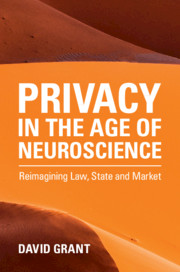Book contents
- Privacy in the Age of Neuroscience
- Privacy in the Age of Neuroscience
- Copyright page
- Contents
- Acknowledgements
- 1 Introduction
- Part I Privacy
- 2 Privacy, Neuroscience and Algorithms
- 3 The Frailty of Privacy Theory
- 4 Privacy as the History of Normalisation
- 5 Privacy, Its Values and Technology
- 6 A New Sense of Privacy
- Part II Regulation
- Bibliography
- Index
3 - The Frailty of Privacy Theory
from Part I - Privacy
Published online by Cambridge University Press: 09 April 2021
- Privacy in the Age of Neuroscience
- Privacy in the Age of Neuroscience
- Copyright page
- Contents
- Acknowledgements
- 1 Introduction
- Part I Privacy
- 2 Privacy, Neuroscience and Algorithms
- 3 The Frailty of Privacy Theory
- 4 Privacy as the History of Normalisation
- 5 Privacy, Its Values and Technology
- 6 A New Sense of Privacy
- Part II Regulation
- Bibliography
- Index
Summary
Examining privacy theory begins with what is absent from present accounts, that is, the central importance of our personal concerns about our existential reality. These concerns, and the disposition to seek ways to distance and camouflage them with constructed concerns, is at the heart of the inducements of what emerged as the mythological trajectory of Deity, State, Market and Technology. The impact of the ideas and practices left behind by these failed but persisting magnitudes is what is normalised in us and comes to comprise what we see as our private world. However, these ideas and practices are mythological subjections. There are two dominant present accounts of privacy, the ‘Constitutional’ (which is sourced from the ideas and practices of Deity, State and Market), which is primarily a bourgeois account, and the ‘Selected Flow of Information’ account (which is inspired by the movement of information within a social context, especially in the technological age). Given the mythological content of both accounts, the way forward needs to take an entirely different approach. This will relocate existential reality to the centre of its frame but also emphasise an ethic which rejects subjection, one framed by respectful self-responsibility.
Keywords
- Type
- Chapter
- Information
- Privacy in the Age of NeuroscienceReimagining Law, State and Market, pp. 71 - 90Publisher: Cambridge University PressPrint publication year: 2021

